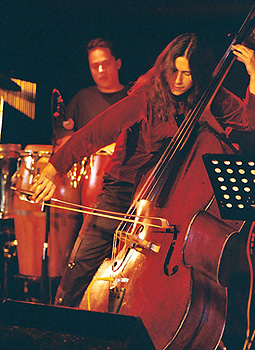Search
Daphna Sadeh in conversation - Cambridge, Dec 2006

Anne L Ryan talks with musician Daphna Sadeh about her philosophy, her multicultural influences, and composing and performing with her band the Voyagers
What motivates your music and performance?
Really, it comes from my enjoyment of bringing people together. Music has this ability to overcome our differences, so it has a healing power - it's all connected to the same thing. When you perform or play for people who are from different backgrounds, they can find something in common through music . There are only a few things in life that can bring people together like that. Music has the power to get straight to the soul of a person without other interferences. I believe we are all the same; we create distinctions by having different religions, cultures and mentalities, but when you take it back to its source, we are all human beings.
You were born and brought up in Israel. Can you describe what that was like?
I was born into a multicultural society - not only Jews, but Arabs, Christians, Bedouin - as a child I was exposed to these cultures. Some of these Jews came from different countries like Russia, Morocco, Yemen, Ethiopia. This was my background. I was born to an Ashkenazi family - my mother's family was from Russia and father from Germany - but I was attracted to Arabic and Middle Eastern cultures. Later on in my life I also loved visiting Sinai Desert and to get inspired by the culture of the Bedouin.
I can see how these cultures filter through your music, but I can also hear a western tone...
Well, I studied music in New York and I love jazz. It was my first preferred style of music. I have worked with other styles of music too, but I think jazz is special for me and is really the music language I feel very inspired by in terms of improvisation style.
At what stage did you became aware of this area of music?
It was as a teenager. I developed a love for the language of jazz and playing improvisation. I use this creatively in my music so essentially I'd describe it as ethnic jazz.
You've been living in Cambridge for four years now. Why Cambridge?
I have a rich cultural heritage which provides me with great inspiration, but when you live in a place where conflict is endemic, there is an awful sense of foreboding. It has a negative affect on you. So I felt I had to take a break from it, and experience a different lifestyle. I had lived in New York, and London was for me quite similar - but then I came to Cambridge and fell in love with it. So my family, my partner and two children have settled here.
Can you give me an example of a piece of your music where it was very clear from the outset what was inspiring you to write it?
Middle Eastern Tango. I composed it when the Iraq war started. In the news there were pictures of children who were victims of it; I tried to capture the affect this had on me. The accordion makes a heavy introduction and then the rhythm and movement of tango helped. So although tango came from Buenos Aries originally, it has a universal element these days, which is a push and pull dynamic between the dancers. It was this emotional tug that I used to represent the conflict in this piece.
What is composing music like for you?
Composing music is like drawing a picture, you want to deliver a certain impact or create a certain impression, so you say, OK I'll use lots of reds here and yellows there, so then you create a sound that has a more aesthetic feel. Or you might say, well, for this effect I want to use this time signature, or a different scale with certain rhythms - so every piece can be composed for a different reason, and it could be that if you have a group of musicians that you wish to write for, that can be inspirational too.
Do you compose with the Voyagers in mind?
I am lucky to work with such dedicated and wonderful musicians. I write to give them a framework to work within so they have a lot of freedom. Sometimes they trigger me to write. And then they give me constructive criticism. They have lots to say, but they also respect that I am the band leader, even though they are all composers in their own right. They keep me on my toes and it keeps me motivated.
You've recorded a new CD; what's it called and when can we hear it?
The next CD will be released in early 2007 and is called Walking The Thin Line. It reflects this feeling of foreboding that remains with me, and in a way reflects reality in many places on the globe. I have worked with the Voyagers on it. They are my friends and great musicians whom I love playing with. It has taken a long time to find the right musicians to work with, but when it gels it is very rewarding. The musicians are Accordian: Koby Isrealite; Oud: Nim Schwartz; Reeds: Stewart Curtis ; Percussion: Ronen Kozokaro and myself on double bass.
Writer: Anne L Ryan
To find out more about Daphna, go to www.daphnasadeh.com